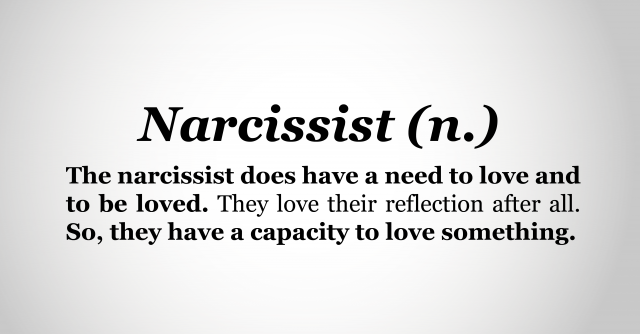We all love ourselves. This is a naturally true statement and even if we don’t tend to think so much about it, we act on it in our day-to-day life. Also, there are those who say they don’t love themselves and have a low self-esteem while there are others who are perfectly fine with who they are.
However, there is one group of people who have a completely different mental construction from others – narcissists.
According to the legend of Narcissus (the Greek boy who fell in love with his own reflection in a pond), narcissists are punished by reflections and echoes their whole life. Narcissists are known to be in love with themselves.
However, this is an illusion. They are in love with their reflection. And there lies the main difference between someone’s true self and their reflected self. Loving your true self is healthy. Loving your reflected self is toxic.
So, the popular fallacy among people is that narcissists love themselves. In reality, they love other people’s impressions of them. And the one who loves only impressions is incapable of loving anyone, themselves included.
The narcissist does have a need to love and to be loved. They love their reflection after all. So, they have a capacity to love something. And driven by the insatiable desire to love (which all people have), the narcissist is obsessed with presenting a perfect image of themselves to the outside world – their “admirers.”
One of the most remarkable aspects of the narcissist’s projected image is their ‘lovability.’ But to a narcissist, love has a different meaning. For them, being loved is the same as drawing attention to themselves, garnering respect, eliciting admiration, inspiring awe, or even being scared.
The narcissist is not someone who is only caring about their needs. On the contrary, they ignore their needs because many of their needs conflict with their alleged omniscience and omnipotence.
The narcissist does not put themselves first – they put themselves last. They cater to the wishes of others because they crave their admiration and love.
In some way, the narcissist nullifies themselves only to re-invent themselves through the gaze of others. The narcissist is someone who is least sensitive to their true needs.
The narcissist guards what they have fiercely and with extreme jealousy. They protect their independence the most.
So, why should others entertain the narcissist, spend their time and energy, give them attention, adulation, and love? The narcissist’s answer is simply – because they are entitled to it.
The narcissist feels that they deserve whatever they extract from other people. Therefore, they feel unprivileged, discriminated, and betrayed when someone treats them with less admiration than they want. They feel entitled to always get more than what they deserve.
The narcissist uses other people to feel that they exist. They are nothing without other people’s praise and adoration. It is through other people’s eyes that the narcissist obtains their grandeur and their sense of uniqueness.
And as time passes, the narcissist will start to view those people as mere objects or instruments of gratification. Then, the narcissist begins to act unscrupulously, constantly provoking and exploiting their ‘sources of narcissistic supply.’
The narcissist does not care about the feelings and needs of others. They are indifferent to the pain and the destruction they cause to other people’s lives. Many narcissists don’t even care about social conventions, let alone for people.
And the emphasis is on ‘do not care.’ Namely, the narcissist is aware of the outcome of their actions. They are not oblivious to the consequences of their behavior and the pain they cause to others. They simply do not care.
The narcissist, willingly or not, uses other people as instruments to maintain their sense of self-worth and buttress their self-image of grandiosity. As long as they serve the narcissist’s purpose, the narcissist holds them in high regard and they are valuable to the narcissist.
This is a result of the narcissist’s inability to love other people. The narcissist lacks empathy, thinks only utility and that’s why the narcissist sees other people as mere instruments.
All this makes the narcissist a monster – a ruthless person who exploits others and uses them to their advantage.
However, many are not aware that deep inside, the narcissist is emotionally empty, completely unsatisfied, and suffers from chronic lack of self-confidence.
To the outside world, the narcissist appears to be an unreliable and unstable individual. But, the narcissist’s volatility fails to capture the barren land of fears and misery that is their soul.
The reckless and audacious behavior of the narcissist covers up for a sad, anxious, and depressive interior.





